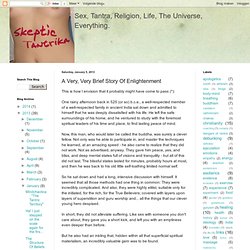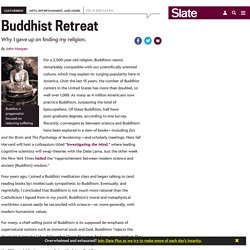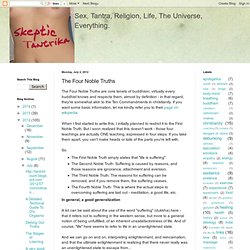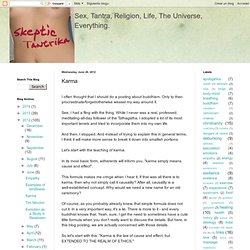

A Very, Very Brief Story Of Enlightenment. This is how I envision that it probably might have come to pass (*): One rainy afternoon back in 525 (or so) b.c.e., a well-respected member of a well-respected family in ancient India sat down and admitted to himself that he was deeply dissatisfied with his life.

He left the safe surroundings of his home, and he ventured to study with the foremost spiritual leaders of his time and place, to find lasting peace of mind. Now, this man, who would later be called the buddha, was surely a clever fellow. Not only was he able to participate in, and master the techniques he learned, at an amazing speed - he also came to realize that they did not work. Not as advertised, anyway. So he sat down and had a long, intensive discussion with himself. In short, they did not alleviate suffering. But he also had an inkling that, hidden within all that superficial spiritual materialism, an incredibly valuable gem was to be found. The Buddha and His Dhamma, by Dr. B. R. Ambedkar.
Buddhism for the Scientifically Oriented (Re: Big Think) Buddhism - Karma, Enlightenment, Meditation. Why I ditched Buddhism. For a 2,500-year-old religion, Buddhism seems remarkably compatible with our scientifically oriented culture, which may explain its surging popularity here in America.

Over the last 15 years, the number of Buddhist centers in the United States has more than doubled, to well over 1,000. As many as 4 million Americans now practice Buddhism, surpassing the total of Episcopalians. Of these Buddhists, half have post-graduate degrees, according to one survey. Recently, convergences between science and Buddhism have been explored in a slew of books—including Zen and the Brain and The Psychology of Awakening—and scholarly meetings. Next fall Harvard will host a colloquium titled "Investigating the Mind," where leading cognitive scientists will swap theories with the Dalai Lama. Four years ago, I joined a Buddhist meditation class and began talking to (and reading books by) intellectuals sympathetic to Buddhism.
Buddhism. The Four Noble Truths. The Four Noble Truths are core tenets of buddhism; virtually every buddhist knows and respects them, almost by definition - in that regard, they're somewhat akin to the Ten Commandments in christianity.

If you want some basic information, let me kindly refer you to their page on wikipedia. When I first started to write this, I initially planned to restrict it to the First Noble Truth. But I soon realized that this doesn't work - those four teachings are actually ONE teaching, expressed in four steps. If you take them apart, you can't make heads or tails of the parts you're left with. So. A lot can be said about the use of the word "suffering" (dukkha) here - that it refers not to suffering in the western sense, but more to a general notion of being unfulfilled, of an inherent unsatisfactoriness of life.
But the truth is that, before we get there, we have to accept quite a lot. Karma. I often thought that I should do a posting about buddhism.

Only to then procrastinate/forget/otherwise weasel my way around it. See, I had a fling with the thing. While I never was a real, professed, meditating-all-day follower of the Tathagatha, I adopted a lot of its most important tenets and tried to incorporate them into my own life. And then, I stopped. And instead of trying to explain this in general terms, I think it will make more sense to break it down into smallish portions.
Let's start with the teaching of karma. In its most basic form, adherents will inform you, "karma simply means cause and effect". This formula makes me cringe when I hear it. Of course, as you probably already knew, that simple formula does not cut it. So let's start with this: "Karma is the law of cause and effect, but EXTENDED TO THE REALM OF ETHICS. " Now it gets interesting. Let's talk about causality first. Weeeeell... yes and no.